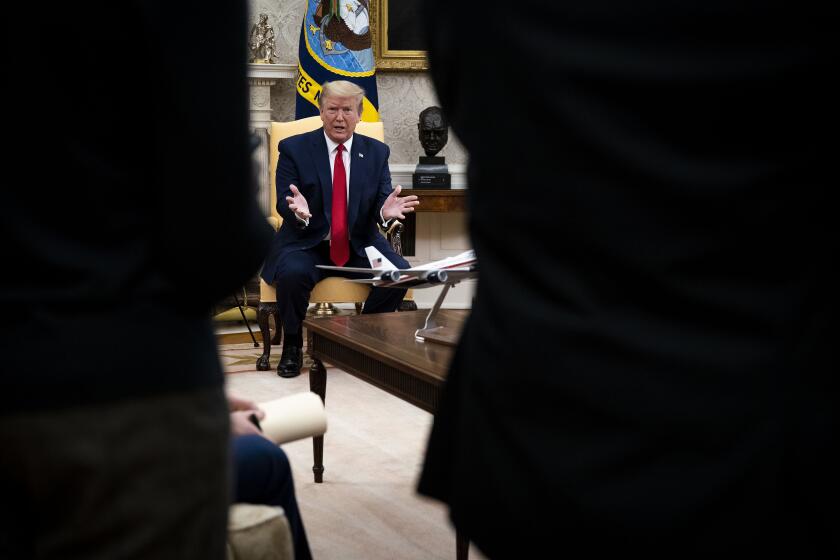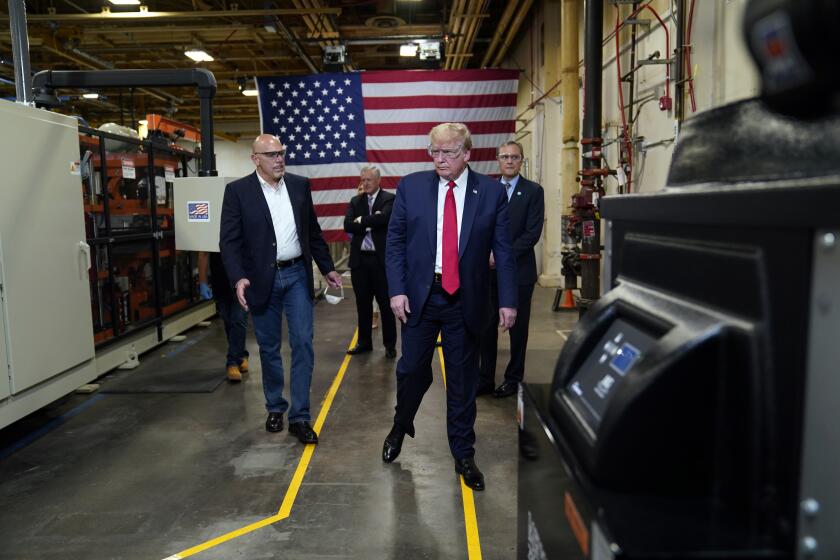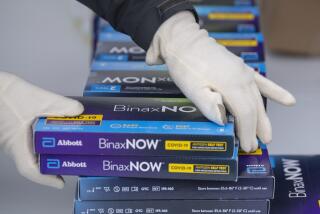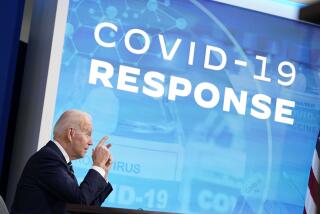Trump backs expanded testing as West Wing battles infections
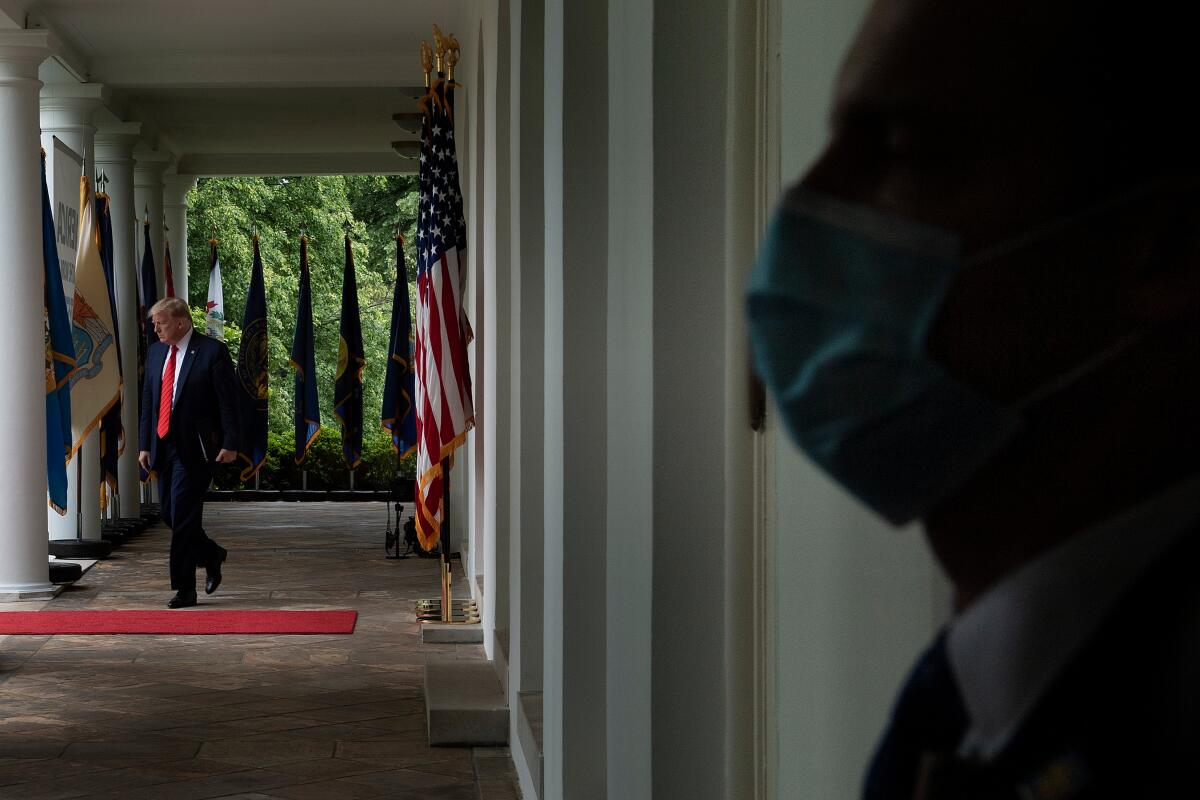
WASHINGTON — Under fire for inadequate coronavirus testing across the country, President Trump insisted Monday that enough testing is available to allow more Americans to safely return to work even as the White House, perhaps the world’s most secure workplace, scrambled to stem further infections in the West Wing.
“It’s the hidden enemy. Things happen,” Trump said at a Rose Garden news conference when pressed about how the virus has breached his inner circle despite safeguards unavailable to most Americans, including daily testing for the president and his top aides.
The president announced a plan to distribute $11 billion approved by Congress last month to support testing efforts by states, with an emphasis on residents and staff of nursing homes, which have suffered the brunt of deaths in the pandemic. Nearly half of California’s COVID-19 deaths so far are in elder-care facilities.
“If someone wants to be tested right now, they will be able to be tested,” Trump claimed, a boast that is untrue in many communities. Roughly 9 million tests have been conducted since the crisis began, far short of what public health experts say is necessary to track and contain the coronavirus.
Adm. Brett Giroir, who leads the administration’s testing efforts, offered a more modest promise. “Everybody who needs a test can get a test,” he said, with a focus on those who suffer symptoms or come into contact with infected people.
Trump’s hourlong news conference marked his latest effort to convince nervous Americans that it’s safe to begin easing restrictions on commerce and public gatherings. Infections continue to rise or plateau in much of the country, and the death toll over the last two months has surpassed 80,000.
The message was particularly discordant as the White House became a marquee cautionary tale about the difficulty of containing the virus. One of Trump’s military valets and a spokeswoman for Vice President Mike Pence have both tested positive in the last week, raising questions about how less-protected Americans can stay safe.
With the economy in free fall and deaths still rising from the coronavirus crisis, President Trump argued Friday that voters shouldn’t hold him responsible.
The White House infections prompted three prominent members of the coronavirus task force — Dr. Anthony Fauci, the government’s top immunologist; Dr. Robert Redfield, director of the Centers for Disease Control and Prevention; and Dr. Stephen Hahn, head of the Food and Drug Administration — to begin isolating themselves. They are scheduled to testify via video conference to a Senate committee Tuesday.
Pence did not attend the news conference, and Trump said they have been staying apart although the vice president’s office denied reports he was quarantining himself. Iowa Gov. Kim Reynolds said she would limit interactions with other people after meeting Trump in the Oval Office last week.
For the first time, the White House ordered all who work in the building to wear masks except at their desks, and top aides — including Jared Kushner, Trump’s senior advisor and son-in-law, and Alex Azar, secretary of Health and Human Services — wore them to Trump’s outdoor news conference.
Trump, who has refused to wear a mask, did not.
Polls show more than half of Americans are not confident it’s safe to end the lockdowns and return to work, despite the economic carnage, and the White House outbreak is unlikely to reassure them.
“If you can’t keep it out of the White House, how are you going to keep it out of the community?” said Craig Fugate, who headed federal emergency operations for President Obama and for former Florida Gov. Jeb Bush at the state level.
Fugate said he feared the administration was rushing too fast to reopen the country, noting that the danger of reopening too soon may not be known for several weeks because it can take time for symptoms to develop.
“You’re going down the road at high speed looking at your rear-view mirror,” he warned.
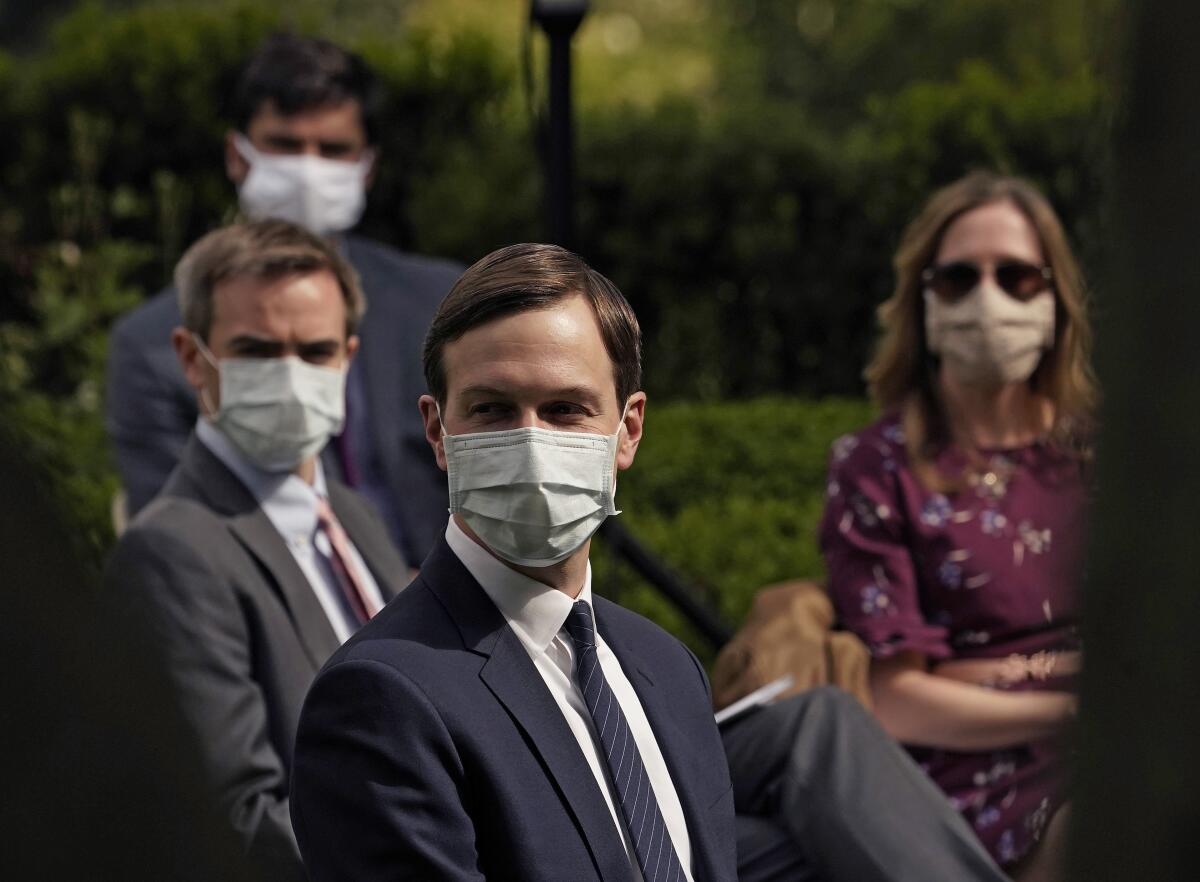
Trump’s support for increased testing comes even though he’s worried that more checks will inevitably find more infections, creating a public relations problem for him by making the number of confirmed cases go up.
The $11 billion that he announced Monday was authorized by emergency coronavirus legislation that Congress passed on April 23.
A senior administration official who briefed reporters said the White House spent the last three weeks seeking input from states about their needs and looking to ensure that supply chains can deliver the equipment needed.
The money will be distributed to states based on caseloads and population estimates, according to the official, who said it was intended to help “ramp up their testing capabilities at a dramatic scale.”
States will be encouraged to focus testing on nursing home residents and their staff, a move that public health experts applauded. But they said a comprehensive testing plan is still needed, and the administration hasn’t offered one.
“Given the high risk and prevalence in nursing homes, this isn’t a bad idea,” said Aaron Carroll, a professor at the Indiana University School of Medicine who has been a leading voice on the issue of testing. “But what’s the next step? What will states do when they get the results, especially if lots of staff are infected?”
Ralph Catalano, a professor of public health at UC Berkeley, described the president’s announcement as “theater.”
“We still don’t know how close we are to herd immunity, because the whole testing effort has been focused on the infection test, not the antibody test, which would tell us how many people have had it,” Catalano said.
Herd immunity refers to resistance within a population to the spread of a contagious disease after enough people have developed immunity either by catching the disease and surviving, or through vaccination. No vaccine is yet available for COVID-19.
Trump, who calls himself a “cheerleader” and a “wartime president,” has chafed at any cracks in his administration’s upbeat messaging facade.
As COVID-19 deaths keep rising, Trump’s message has shifted from ‘one is too many’ to praising Americans as warriors fighting to open the economy.
He was “not happy” that Kevin Hassett, one of his economic advisors, said Sunday on CBS’s “Face the Nation” that it was “scary to go to work” at the White House given the outbreak there, said one administration official speaking on the condition of anonymity to discuss private conversations.
“That completely undermines the message he is trying to send to the country,” the official said.
More than 33 million Americans have filed for unemployment since the pandemic began, and Treasury Secretary Steven T. Mnuchin told “Fox News Sunday” that “the reported numbers are probably going to get worse before they get better.”
Trump is urging governors to lift restrictions to revive the economy, and about half the states have begun to do so. He accused Democrats on Monday of “moving slowly, all over the USA, for political purposes” to hurt his chances for reelection in November.
Singling out Pennsylvania, a swing state with a Democratic governor, Trump tweeted that residents “want their freedom now, and they are fully aware of what that entails.” Trump could be visiting the state sometime soon.
Joe Biden, the presumptive Democratic presidential nominee, argued Monday that Trump was presenting a “false choice” to Americans.
“The truth is that everyone wants America to reopen as soon as possible — claiming otherwise is completely absurd,” Biden wrote in an op-ed in the Washington Post. “Governors from both parties are doing their best to make that happen, but their efforts have been slowed and hampered because they haven’t gotten the tools, resources and guidance they need from the federal government to reopen safely and sustainably. That responsibility falls on Trump’s shoulders — but he isn’t up to the task.”
More to Read
Get the L.A. Times Politics newsletter
Deeply reported insights into legislation, politics and policy from Sacramento, Washington and beyond. In your inbox three times per week.
You may occasionally receive promotional content from the Los Angeles Times.
